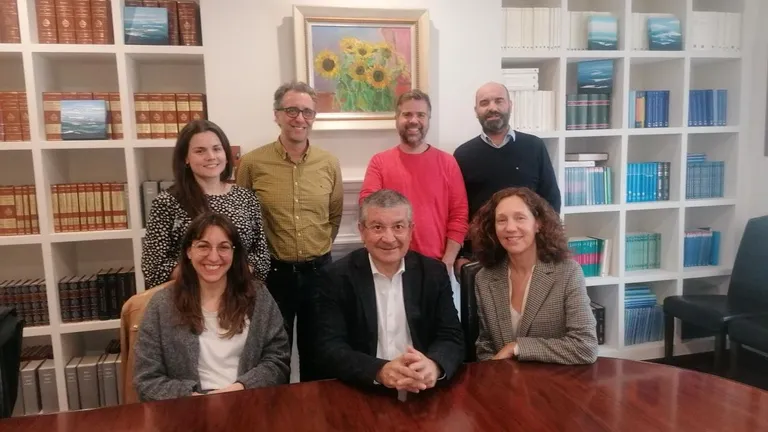The Galician company Batea Oncology is developing a pioneering treatment for glioblastoma, a brain cancer for which there are hardly any therapeutic options and with a low survival rate.
The rafts that float in the Galician estuaries serve as a nest for the mussels so characteristic of its gastronomy, and also give their name to a recently created company that has been working for years to develop a pioneering treatment for glioblastoma, a brain cancer with very few therapeutic options. “We visualised GlioHook and its effect on tumour cells as the rafts to which mussels are anchored”, describes Sonia Martínez to explain how the medical device developed by Batea Oncology, the company she founded together with Alba Ferreirós, Miguel Abal, Jorge Barbazán, Eladio Crego, Lorena Alonso and Rafael López, works.
Its origin is in another company also with a seafood name, Nasasbiotech, born to put into practice the results of the research carried out between the Hospital Clínico Universitario and the Instituto de Investigación Sanitaria de Santiago de Compostela, in the group of Translational Medical Oncology, Oncomet, led by doctors Rafael López and Miguel Abal; at the end of 2023 the idea arose to constitute an independent company to focus on the development of the technology for its application in glioblastoma.
Current treatments for this type of cancer combine surgery with radio and chemotherapy; however, due to the delicate nature of the brain, operations cannot be very aggressive and there are always residual tumour cells, which end up growing and giving rise to relapses. “The technology we have developed targets precisely these residual cells, with the aim of keeping them under control and thus limiting the recurrence of the tumour,” explains the CEO of Batea Oncology. GlioHook is a device composed of a synthetic biomaterial, which is implanted at the time of surgery in contact with the residual tumour cells: “On the one hand, it focuses these cells in a controlled place, as they prefer to concentrate on the device rather than infiltrate the healthy brain, and, on the other hand, it makes them more sensitive to radiotherapy,” explains Martínez, adding that they have already tested in animal models with the disease, in which they managed to extend survival by 50% more.
This medical device represents a radical change in the treatment of these brain tumours because it acts purely through a physical mechanism and not a pharmacological one, which greatly reduces the risk of toxicity: “This mechanism of action is a clear novelty in the field of oncology,” the company stresses.
The biotech company’s short-term goal is to demonstrate the efficacy of the project in patients. To do this, they must complete a series of tests to ensure the safety of patients, which is what they are working on at the moment. Once this process, known as regulatory preclinical research, is completed, they will start the phase I clinical trial in three Spanish hospitals that have already been contacted, including the hospital in Santiago de Compostela.
To date, they have invested more than one million euros, “and we estimate that we will need another three million to complete the phase I trial, which could be completed by 2028,” Martínez explains. The next phase would involve a second clinical trial with a larger number of patients, which would take until an estimated approval date around 2031: “It’s a long and very expensive process, because obviously it has to be very patient-friendly,” Martínez stresses.
Batea Oncology is a 100% Galician company; among its founders are the research team that has developed the technology, including Rafael López and Miguel Abal, but also Jorge Barbazán, who is the company’s scientific director, and the researchers Lorena Alonso and Alba Ferreirós. Finally, the two profiles that complete the team are Eladio Crego and Sonia Martínez Arca, experts in startup management. All of them have extensive experience in biomedical research, innovation and entrepreneurship in Galicia. The company is a partner of the Clúster Tecnolóxico Empresarial das Ciencias da Vida (Bioga), which represents the biotechnological ecosystem of Galicia, with more than 160 companies with a turnover of more than 1,500 million euros and employing 6,000 people.
Original news: Tecnología que atrapa células tumorales – lavozdegalicia.es (08/09/2024).
For BIOGA, it is a priority to promote intersectoral collaboration with other entities and to promote national and international networking activities. If you want to know more about us, please visit the following link.
- The Galician biotech ecosystem goes to North Carolina on a trade mission to explore business opportunities and position Galicia as a bioregion of reference
- The University of A Coruña leads two lines of research in biotechnology for health
- Galicia created 13% of the biotech firms born in Spain in 2023 and consolidates its position among the most bio-entrepreneurial autonomous communities
- Medrar, the company that helps the countryside to grow
- Enzicas: maturation based on enzymes and chestnuts
- Biotechnology holds a prominent role in the policy directions for the next European Commission 2024-2029
- CEAMSA presents its FABRINTYSO project, smart and sustainable production to boost industrial competitiveness
- The Zendal Group launches the 5th edition of its International Zendal Awards for human and animal health projects.
- Hijos de Rivera beats on quantum computing and AI to research flavors of the future
- Galicia Biodays hosted more than 800 ‘one to one’ meetings

